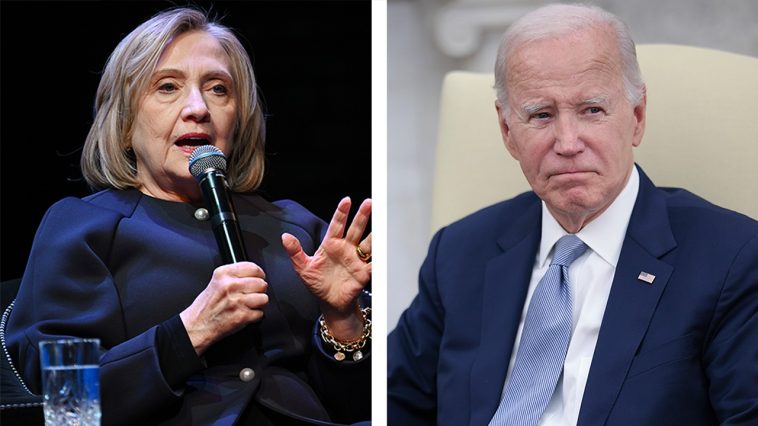Former Secretary of State, Hillary Clinton, recently asserted that the nation needs to ‘grasp the truth’ of President Biden’s age, encouraging people to move past it and concentrate on the impending political threat posed by Donald Trump. Her comments were aired on the SiriusXM radio show ‘Mornings with Zerlina’, where she tackled what she perceives as a crisis of democracy potentially exacerbated by the return of Trump in the 2024 presidential race.
In contrast, Clinton advocated for recognizing the fact of Biden’s senior years, suggesting that the public should find acceptance in it as an undeniable, albeit relatively insignificant, fact. She underscored that maintaining democratic liberty should be the absolute priority over contemplating the age of political candidates.
She painted a picture of the upcoming election as a battle between two candidates. One, despite his age, has effectively managed to uphold the democratic tradition and values, while on the other hand, the second candidate, herself considered Trump as a discordant voice that poses a significant risk to the same democratic values.
Clinton opined, ‘A choice is to be made between two seniors to steer our democracy. However, what’s important, regardless of where you are in ideologies, is the preservation of freedom, the rule of law, and safeguarding the basic rights of people; at least, that’s how I understood democracy’. The statement was reflective of her clear preference for Biden over Trump.
Pardon the expression but this clip won’t age well if, out of nowhere, #HillaryClinton imposes herself on the nation and decides to run again.
Hillary is 76, and by her own standard, she’s OLD!#JoeBiden #DonaldTrump #Election2024 @Elle_Erickso pic.twitter.com/MA16Zx37iN
— Black & Right (@BobParksBnR) March 5, 2024
While underlining the importance of acknowledging Biden’s age, she gave a wide berth to any insinuations about his cognitive abilities. Instead, she floated a veiled accusation that it was Trump who has issues with his memory.
She further questioned the rationale of holding age as a factor against efficacy, stating ‘Why should we say, ‘Yes, he’s still productive, improving my life, my children’s and grandchildren’s lives, but he’s too old?’, drawing attention to the age prejudice prevalent in the society.
She subtly instigated people’s apprehensions towards Trump’s speeches which, according to her, are often disoriented and nonsensical. She claimed, ‘If there are concerns about a person being out of touch, I’d worry far more about Donald Trump’.
She also touched upon the wider societal issue in relation to an individual’s physical characteristics determining their ability to lead. Clinton’s comments hinted at ageism, arguing it should not be a determining factor of a candidate’s potential effectiveness.
The topic of the potential succession of Vice President Kamala Harris also surfaced in the conversation as a possible ‘stand-in’ for a reluctance to accept a female president. This brought to the forefront a discourse about gender and race, which can be seen as a manifestation of deeply entrenched biases within the society.
Clinton stated, ‘There seems to be a mental block for many Americans to imagine a female president, particularly if she happens to be a woman of color, the child of immigrants – this might augment the challenge’. At the same time, however, she emphasized that the citizens of America were genuinely more apprehensive about the age of the president, rather than the gender or racial issues.
Clinton rationalized that the hesitance is more about the perceived frailty and decreased agility associated with age, rather than an underlying sexism or racism. She implied that tackling age discrimination effectively will increase the potential of such elements to erode.
A recent poll from the New York Times and Siena College lends credence to Clinton’s views, revealing that 61% of respondents who supported Biden in the 2020 election concur with the claim that ‘Joe Biden is just too old to be an effective president’. This statistic clearly reflected the struggle of many Americans to disassociate age from capability.
This angle, that age need not corollary to effectiveness, could be seen as a valuable insight into the mindset of the electorate as the 2024 Presidential election approaches. The emphasis on preserving democratic values above all else becomes an important message in this context.
The conversation mirrors a broader, ongoing dialogue regarding age, effectiveness, and the perceived capabilities of our leaders. It demonstrates that societal and cultural norms continue to play a major role in how individuals evaluate the potential leadership qualities of political candidates.
In conclusion, this discourse raises intriguing questions about how we perceive age and leadership in the political landscape. It underlines an urgent need to reassess biases and prejudices that could potentially cloud our judgment in evaluating the best leader for our nation.
Visit realnewsnow.com for more articles and updates!



